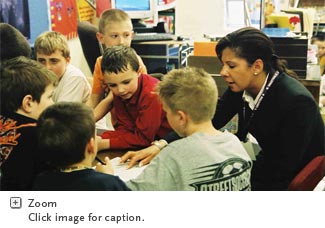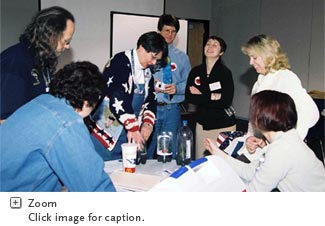|
The hallmark of Journey
through the Universe programming in a community is collaboration
at both the local and national level. Programs are delivered by a
National Team of researchers and
educators from institutions across the nation. Within the
community, a Local Team of institutions and educators
ensures that programming addresses strategic educational needs, and is
implemented to maximize impact.
|
|
 Journey through the Universe programming
is delivered by a National Team of engineers and scientists, and master
science educators—the Visiting
Researchers and Visiting Educators—from
the National Center for Earth and Space Science Education, and research
and education organizations across the nation. Journey through the Universe programming
is delivered by a National Team of engineers and scientists, and master
science educators—the Visiting
Researchers and Visiting Educators—from
the National Center for Earth and Space Science Education, and research
and education organizations across the nation.
A total of 114 Visiting
Researchers have participated in the Journey through the Universe
program to date, representing 38 research organizations, including:
NASA field centers, universities, and research companies.
List of Visiting
Researchers (PDF, 160 KB)
The Visiting Researchers
are individuals that choose to set aside their research to travel to
your community because they feel that education is vitally
important. Their host institutions feel the same way, and support
their time with you. These engineers and scientists are role
models and heroes for the next generation, and instill in audiences a
sense of national pride in what individuals can aspire to achieve
through education.
You can view a list of
currently participating Visiting Researchers here.
The Visiting Educators
are master science educators specializing in Earth and space science
education, with a track record of delivering high quality professional
development workshops for grade K-12 teachers. The Visiting
Educators are either from the National Center for Earth and Space
Science Education, or are NASA MESSENGER Educator Fellows—a program
overseen for NASA by the Center. The Fellows were selected
through a national competition seeking to build a corps of 30 of the
best Earth and space science educators across the nation in order to
deliver professional development for 3,000 teachers per year.
You can view a list of
currently participating Visiting Educators here.
The prestige and caliber
of the National Team provide incentives for community-wide
collaboration on program planning, and extensive coverage by the media.
|
|
 Journey through the Universe
is realized through a sustained partnership between the National Center
for Earth and Space Science Education and a local consortium—the Local
Team—whose members reflect the institutional diversity of the
community, including K-12 school districts, informal science education
organizations (e.g., museum, planetarium, science center),
civic and business groups and organizations, colleges and universities,
and research organizations. Journey through the Universe
provides a framework for partnership across an entire community. Journey through the Universe
is realized through a sustained partnership between the National Center
for Earth and Space Science Education and a local consortium—the Local
Team—whose members reflect the institutional diversity of the
community, including K-12 school districts, informal science education
organizations (e.g., museum, planetarium, science center),
civic and business groups and organizations, colleges and universities,
and research organizations. Journey through the Universe
provides a framework for partnership across an entire community.
A school district either
provides the organizational leadership for the Local Team, or shares it
with another institution such as a museum or university. The
Local Team includes a curriculum specialist(s) and a corps of Master
Science Educators from grade levels identified by the
community as the target audiences.
The Local Team is
responsible for tailoring Journey through the Universe
programming to the educational needs of the community, creating
program-buy-in at the local level, and for carrying out logistical
arrangements for the programming, e.g., scheduling class
visits with the schools, and securing venues for workshops and
family/public programs. Program managers with the National Center
for Earth and Space Science Education will work directly with the Local
Team, providing: ongoing guidance and assistance with program
definition; a robust suite of logistical tools, such as timelines with
milestones, classroom visit schedules, a programming ‘How-To’ manual,
and templates for advertising; bios and presentation descriptions for
the National Team members; and programming resource requirements such
as AV needs and supplies for workshop activities.
Sustainability is viewed
as key to success, and a Local Team that can ensure local programming
over the long term, using regularly provided national resources, is key
to sustainability. The leadership of the Local Team must
therefore demonstrate authority to conduct school district-wide
programming, and access to the significant local human-power and other
resources needed to carry out programming.
|
